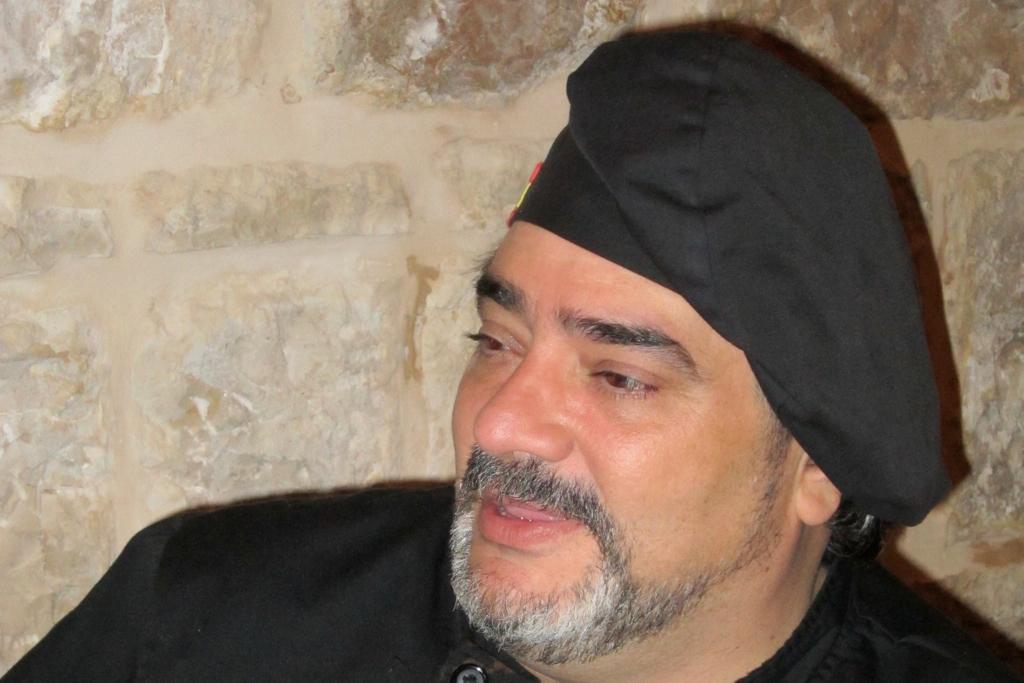The best holiday food in Jerusalem
Chef Rodrigo Gonzalez at La Rotisserie, a restaurant popular with expats, in Jerusalem.
JERUSALEM — Perhaps it takes a real nomad to know that winter and sparkling lights can provoke nostalgia in just about anyone, even the most rugged of globetrotters.
So it should surprise just about no one that Rodrigo Gonzalez, the son of Cuban exiles born in Levittown, Penn., in 1964, and reared, among other places, in Spain, Brazil, Singapore, Indonesia and India, should wish to provide for those far away from home and stuck by a pang of gastronomic wistfullness.
Gonzalez is executive chef at La Rotisserie. Despite its Gallic name, it is a mecca of Spanish cuisine that offers such delicacies as classic Madrid tortilla and pillowy baby calamari stuffed with shrimp, in a black puddle of squid ink. It is without doubt the only eatery in Jerusalem in which you can get genuine Pata Negra jabugo ham, which Gonzalez personally imports into Israel in 90 pound vacuum packed batches.
La Rotisserie is an unlikely place to go to eat, if not to pray: you will find it at the ground level of the Notre Dame Pontifical Center, a big stone fortress of a building flying the Vatican flag just outside the New Gate to the Old City of Jerusalem, which is the formal residence of the Pope in this other eternal city.
In mid-November, for his French clientele, Gonzalez organized a weeklong menu inspired by new Beaujolais. In late November, it was the Yanks’ turn.
But instead of recreating a traditional Thanksgiving menu, Gonzalez decided to play with the flavors and the ingredients. One first course: Pumpkin ravioli stuffed with turkey, foie gras and mascarpone cheese, in a saffron cream sauce. The turkey itself came in the form of a roulade, stuffed with mushrooms and cashew nuts, accompanied by a red wine sorbet.
More from GlobalPost: Rediscovering an ancient Israeli booze
Or, as Annie Fields, 23, a master’s student from Pittsburgh, who, having broken up with her Israeli boyfriend was enjoying a solitary meal on Thanksgiving night said, “It’s a little bit of the feeling of home, but with a European touch.”
La Rotisserie is an oddity among the Mediterranean-style restaurants that are common in Jerusalem. It inhabits a low space that resembles a swish crypt and that offers poor cellphone reception; priests are frequent clients. With arced ceilings, vaulted rooms and white tablecloths, it is a place Israelis go to feel a little bit abroad.
Gonzalez has been at La Rotisserie for three years. Most of his patrons are expats and he is known for attempting to indulge their cravings for the feeling of home. Valentine’s Day, Christmas and New Year’s menus have become common annual nights at la Rotisserie, but, he says, despite the “terrible quality of Israeli turkeys, more and more people have been requesting a real Thanksgiving.”
He still remembers the neighbors in Levittown, where he lived until the age of seven, coming over when the scent of his grandfather’s roasting coffee wafted over their garden fences. To this day, he travels on the United States passport.
“It’s my strongest affiliation,” he says, “the only country where I am not a foreigner. You are always grateful to the nation that welcomed you when you needed a place.”
We want to hear your feedback so we can keep improving our website, theworld.org. Please fill out this quick survey and let us know your thoughts (your answers will be anonymous). Thanks for your time!
